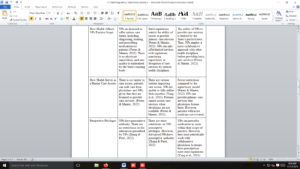State laws and federal regulations
NPs have scopes of practice that are regulated by state laws, boards of nursing, boards of medicine, and reimbursement that may differ depending on your location. There are several sources of restrictions to NP practice, such as state laws and federal regulations which include who may prescribe controlled substances and which substances NPs can prescribe, as well as the various reimbursement agencies. It is essential that the NP be fully informed of what they are allowed to do by law (state and federal) or by other regulatory organizations. These regulations vary widely from state to state. They may also vary by facility policy if more stringent. Consequences of practicing outside your scope of practice may be anything from a fine to suspension or revocation of your license, a civil lawsuit, or even criminal charges.
Use the provided template to compare and contrast the three major regulatory practice models for NPs: supervisory, collaborative, and independent. Read the rubric. Please keep this assignment in the template format provided. This assignment requires credible and up-to-date resources for each category. Include in each model at least one state that represents the scope of practice you are discussing.
Format expectations:
- Include a title page and reference page.
- Follow all assignment directions.
- Organize information in paragraphs and paper to convey the content to the reader.
- Use the assignment grid template.
- Follow APA paper format, including for the reference page, in-text citations, and headings.
- Use four or more credible peer-reviewed sources.
Answer preview
Impact on Payer Status for NP The model falls victim to the same system that compensates NPs based on education level rather than practice experience (Yang et al., 2021). The model has strict policies that mandate NPs to serve as employees in hospitals or as private physicians (Yang et al., 2021). This approach is strict regarding NPs’ payer status. Pay is done through physicians or medical centers as NPs are seen as less experienced. Job Satisfaction High job satisfaction: NPs have access to various options based on their expertise and career plans, allowing NPs to provide better care (Mahoney et al., 2020). Low job satisfaction and high turnover rate (Mahoney et al., 2020). NPs restricted in using their full expertise in care provision opt to pursue optional jobs. Average job satisfaction; lesser restrictions on NPs regarding practice regulations (Yang et al., 2021). [661 Words]

State laws and federal regulations

